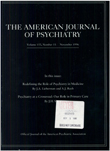Melancholic symptom features and DSM-IV
Abstract
OBJECTIVE: The purpose of this article is to provide an overview of existing systems for the diagnosis of the endogenous (melancholic) subtype of major depression. METHOD: The authors review the critical empirical research examining this subtype and discuss its implications for DSM-IV. They examine the relationship of endogenous/melancholic symptoms to other clinical features, treatment response, selected laboratory tests, consistency across episodes, family history, and particular courses of illness. RESULTS: Melancholic symptom features are predictive of a positive response to ECT and to tricyclic antidepressants in the severely ill. Key features include psychomotor retardation, unreactive mood, pervasive anhedonia, and distinct quality of mood. Melancholic features are associated with shorter REM latency and/or nonsuppression of cortisol during the dexamethasone suppression test. Depressive episodes that are not melancholic may take on melancholic features with repetition and passage of time in some individuals. Once melancholic features are present, it is unclear whether they repeat across subsequent episodes. Melancholic features are not uniquely associated with a positive family history of depression per se, but they may be especially associated with a family history of severe depression. CONCLUSIONS: The available evidence suggests some clinical utility and some (albeit not entirely consistent) validity for the concept of melancholic features. Consequently, DSM-IV will retain the designation "with melancholic features," return to the shorter DSM-III feature listing, and broaden the designation by requiring either unreactive mood or pervasive anhedonia but not both. Further research on this subgroup is indicated.
Access content
To read the fulltext, please use one of the options below to sign in or purchase access.- Personal login
- Institutional Login
- Sign in via OpenAthens
- Register for access
-
Please login/register if you wish to pair your device and check access availability.
Not a subscriber?
PsychiatryOnline subscription options offer access to the DSM-5 library, books, journals, CME, and patient resources. This all-in-one virtual library provides psychiatrists and mental health professionals with key resources for diagnosis, treatment, research, and professional development.
Need more help? PsychiatryOnline Customer Service may be reached by emailing [email protected] or by calling 800-368-5777 (in the U.S.) or 703-907-7322 (outside the U.S.).



